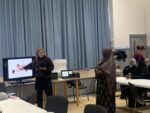A new video, from Neuromod+ awardee Mahnaz Arvaneh and team, highlights the importance of diversity in in brain research. The collaborative team were awarded funding from Neuromod+ for their projects: “Fostering Acceptance and Inclusivity of Non-Invasive Neurotechnology in African Ethnic Minority Communities” and the follow-up “Bridging the Gap: Promoting Acceptance and Inclusivity of Non-Invasive Neurotechnology in Ethnic Minority Communities”.
Mahnaz writes “Brain research and neurotechnologies are transforming healthcare, from understanding how the brain works to developing new treatments for conditions like stroke and epilepsy. But these technologies don’t always work equally well for everyone. Biological and phenotypic factors—such as hair type, skin tone, head size, skull thickness, and hormonal differences—can all influence how well neurotechnologies capture brain signals. This means that if research excludes people from diverse backgrounds, the results may not be reliable or beneficial for all communities. Despite this, participants from minority populations remain critically underrepresented in UK neurotechnology studies. A University of Sheffield-led project, funded by the UKRI Neuromod+ Network, set out to change this.
In collaboration with the Israac Community Centre in Sheffield, researchers co-designed interactive workshops to explore how communities engage with brain research. Shaped around cultural needs, these sessions built trust, improved understanding, and revealed practical barriers and solutions—leading to recommendations for more inclusive study designs and even a prototype EEG electrode.
The project was a joint effort between the University of Sheffield (led by Dr Mahnaz Arvaneh and Dr Dan Blackburn) and the NIHR Devices for Dignity MedTech Co-operative (led by Lise Sproson). It highlights the value of working directly with communities to build trust, raise awareness, and adapt research tools that make participation easier and more representative.
To share the outcomes, the team created a short video, designed to raise awareness among both researchers and communities about the importance of diversity in brain research.
This work provides a model for inclusive, community-led neurotechnology research that can be replicated across the UK and beyond.”
View and share the video here: Equality & Diversity in Neuroscience
This work has also been reported in the EPSRC Healthcare Technologies Newsletter Oct 25.




